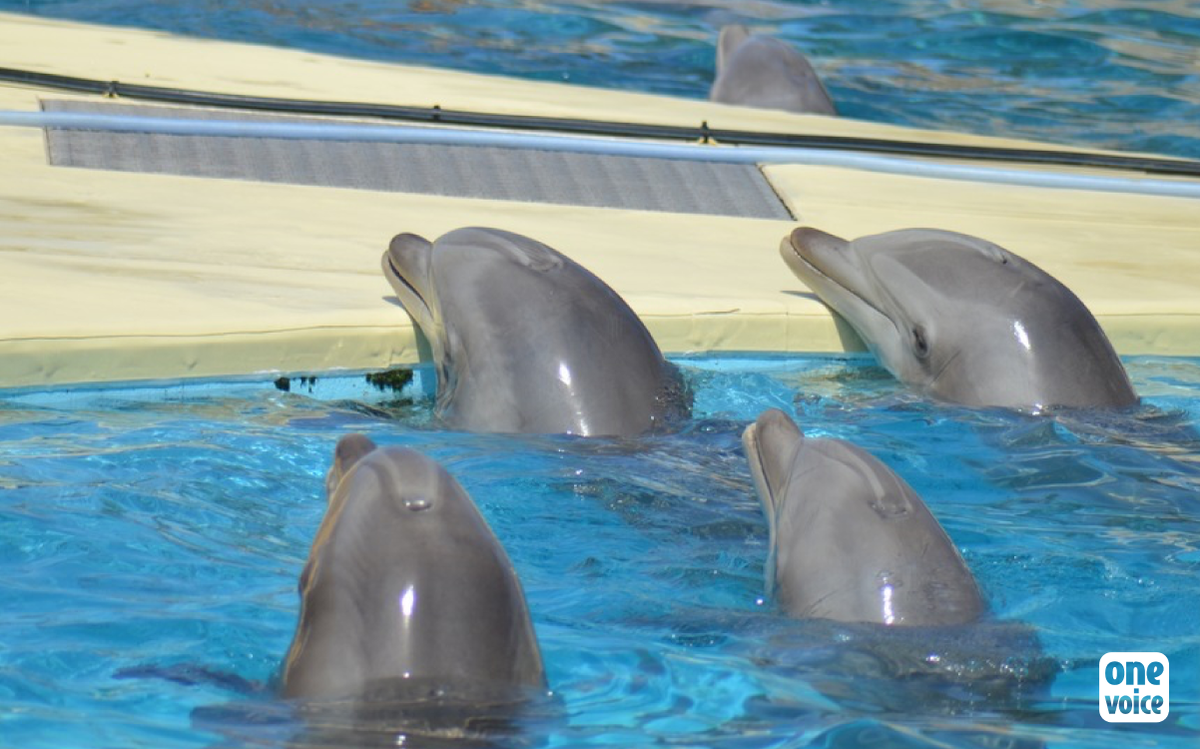

Alizé
Décès : le dauphin Alizé s’est éteint à 24 ans dans un bassin du Marineland d’Antibes. D’après le parc, il souffrait de problèmes incurables. Nous en doutons…
Le 13 mai 2016, le jeune dauphin Alizé s’est éteint à 24 ans dans un bassin médical du Marineland d’Antibes. D’après le parc, Alizé souffrait depuis longtemps de problèmes rénaux incurables. Oui, mais lesquels ? Et pourquoi incurables ?
Fidèle à la tradition des delphinariums, l’éloge funèbre d’Alizé laisse perplexe : « Les soigneurs appréciaient son caractère indépendant, jovial et très joueur. Alizé faisait partie d’un groupe de dauphins dans lequel les naissances, ces dernières décennies, assurent la continuité des générations ». Indépendant et très joueur ? Alizé était un esclave, fils d’esclaves et n’avait d’autre choix que de « jouer » plutôt que de chasser ou d’explorer le vaste océan avec ses amis. Quant à la continuité des générations, il ne fut jamais père. Et depuis un an, il n’était plus jovial… Début 2015, une source interne au parc laissait filtrer que deux dauphins avaient disparu. Un troisième, Alizé, semblait gravement malade. En juillet, son directeur finit par déclarer : « Eclair est mort en février 2015, Mila-Tami en janvier 2015. Alizé est toujours là, dans le bassin à spectacles, je viens de lui dire au revoir avant de partir». Tout récemment, une tente de toile blanche plantée au-dessus du bassin médical attirait l’attention des curieux. Le signe qu’un dauphin était en train de mourir. Et c’était Alizé, fauché par une «maladie rénale incurable».
De quelle maladie parle-t-on ?
Sans accès aux dossiers vétérinaires, on ne peut qu’émettre des suppositions, mais tout porte à croire qu’Alizé souffrait de calculs rénaux, comme tant d’autres dauphins captifs. « La lithiase urinaire, ou calculs des reins, est très commune parmi les dauphins Tursiops gardés en delphinarium», explique en substance une étude scientifique publiée en 2013 intitulée «Comparison of Nephrolithiasis Prevalence in Two Bottlenose Dolphin Populations ». « En revanche, des analyses comparatives ont permis de constater que cette maladie était absente en milieu naturel chez les dauphins sauvages de la Baie de Sarasota ».
En d’autres termes, les problèmes rénaux d’Alizé seraient la conséquence directe de sa vie en captivité.
Bien d’autres affections de ce type, que l’on pourrait qualifier de nosocomiales, déciment les bassins. Ainsi, les pathologies pulmonaires provoquées par le chlore, les maladies du foie liées à l’ingestion massive de compléments alimentaires et à l’excès de globules rouges, les ulcères à l’estomac causés par le stress, les mycoses dues à une vie confinée dans une eau chaude et mal filtrée, etc. Quant aux calculs rénaux, l’hydratation insuffisante des dauphins nourris de poissons surgelés pourrait notamment en être responsable – ainsi que leur alimentation exclusivement diurne, les soigneurs ne travaillant pas la nuit. Tous les facteurs de risques sont bien sûr amplifiés par l’effondrement des défenses immunitaires sous le poids du désespoir et de l’ennui.
Alizé a certainement beaucoup souffert, car la lithiase urinaire peut s’avérer atrocement douloureuse, avec ses coliques néphrétiques fulgurantes.
Par contre, il est curieux qu’il en soit mort, dès lors que son problème rénal était correctement traité. Qu’a-t-il pu se passer ? Comme si souvent dans d’autres delphinariums, la lithiase d’Alizé a dû se compliquer brusquement en infection bactérienne. Le même problème advient à Tilikum, l’orque enfermée au SeaWorld de Floride, qui fut gavé toute sa vie d’antibiotiques et que ravage aujourd’hui une bactérie multirésistante dont aucun traitement ne vient à bout.
L’an dernier, Eclair est mort à 26 ans d’un cancer de la prostate.
Mila, sa fille, périt à l’âge de 9 ans d’une occlusion gastrique provoquée par des matières végétales. Avant eux, l’orque Valentin décédait d’une torsion de l’intestin et sa mère Freya d’un arrêt cardiaque ! Voilà des fins de vie peu fréquentes en mer, où l’on meurt davantage de vieillesse, noyé dans un filet, mutilé par un bateau, victime d’une épidémie ou d’une pollution majeure, qu’en avalant des algues imbibées de chlore ! Ce qui n’empêche nullement l’espèce Tursiops truncatus de s’en sortir plutôt bien et de peupler abondamment tous les océans tempérés du monde.
A l’inverse, il est troublant de constater que trois jeunes dauphins viennent de s’éteindre en quelques mois, alors que tous avaient vu le jour dans un bassin cerné de soigneurs et de vétérinaires, à l’abri de tout danger, de toute pollution et de tout souci alimentaire. Malgré cela, aucun dauphin du Marineland n’a jamais pu atteindre l’âge de la vieillesse (60 ans) ni même l’âge moyen (40 ans) des dauphins libres, tels qu’établis par la NOAA (National Oceanic and Atmospheric Administration).
Pourquoi ?
Parce que des espèces marines migrantes de grande taille, dotées d’une vive intelligence et d’une riche vie sociale, ne pourront jamais s’épanouir dans des cachots aquatiques. La captivité est fondamentalement toxique pour les cétacés et c’est pourquoi One Voice réclame son abolition immédiate sur tout le territoire français.
Merci de nous y aider en signant notre
pétition !
Sources